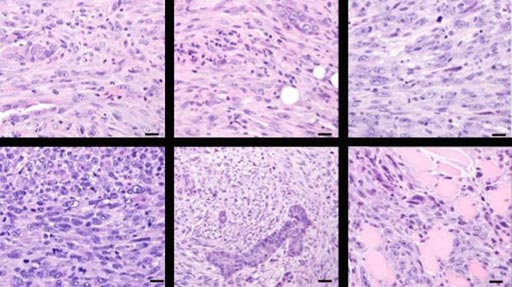New Model to Aid Research on Rare Type of Aggressive Breast Cancer
By LabMedica International staff writers
Posted on 17 Jan 2017
Cancer researchers have created a new mouse model that will allow them to study in vivo the molecular factors linked to the development of metaplastic breast cancer, a rare form of triple-negative breast cancer.Posted on 17 Jan 2017
Metaplastic breast cancer is very rare and aggressive, accounting for only about 1% percent of breast tumors. This type of cancer is characterized by cells that are more mesenchymal, a cell state that enables them be migratory and invasive.

Image: Mammary tumors caused by deleting CCN6 in a mouse model look like human metaplastic carcinoma (Photo courtesy of the University of Michigan).
Investigators at the University of Michigan had been studying the link between metaplastic breast cancer and the protein CCN6. CCN6 (WNT1-inducible-signaling pathway protein 3 or WISP3) is a matricellular protein that in humans is encoded by the WISP3 gene. It is a member of the CCN family (CCN intercellular signaling protein) of secreted, extracellular matrix (ECM)-associated signaling matricellular proteins. The CCN acronym is derived from the first three members of the family identified, namely CYR61 (cysteine-rich angiogenic inducer 61, or CCN1), CTGF (connective tissue growth factor, or CCN2), and NOV (nephroblastoma overexpressed, or CCN3). These proteins, together with WISP1 (CCN4), and WISP2 (CCN5) comprise the six-member CCN family in vertebrates.
In the current study, the investigators found that CCN6 was significantly downregulated in clinical samples of human spindle cell metaplastic breast carcinoma. To investigate the effect of CCN6 downregulation on cancer development, the investigators genetically engineered a line of mouse that lacked the gene for CCN6 in the mammary gland.
The investigators reported in the November 7, 2016, online edition of the journal Oncogene that these mice displayed severe defects in ductal branching and abnormal age-related involution compared to littermate controls. The animals developed invasive high-grade mammary carcinomas with bona fide epithelial to mesenchymal transition (EMT), histologically similar to human metaplastic breast carcinomas. Global gene expression profiling of mammary carcinomas from the mice and comparison of orthologous genes with a human metaplastic carcinoma signature revealed a significant overlap of 87 genes.
""Metaplastic breast cancers are challenging to diagnose and treat. In part, the difficulties stem from the lack of mouse models to study this disease," said senior author Dr. Celina Kleer, professor of pathology at the University of Michigan. "Our hypothesis, based on years of experiments in our lab, was that knocking out this gene would induce breast cancer. But we did not know if knocking out CCN6 would be enough to unleash tumors, and if so, when, or what kind. Now we have a new mouse model, and a new way of studying metaplastic carcinomas, for which there is no other model. After a year, the mice started to form mammary gland tumors. These tumors looked identical to human metaplastic breast cancer, with the same characteristics. That was very exciting."
"Understanding the disease may lead us to better ways to attack it," said Dr. Kleer. "For patients with metaplastic breast cancer, it does not matter that it is rare. They want - and they deserve - better treatments."













